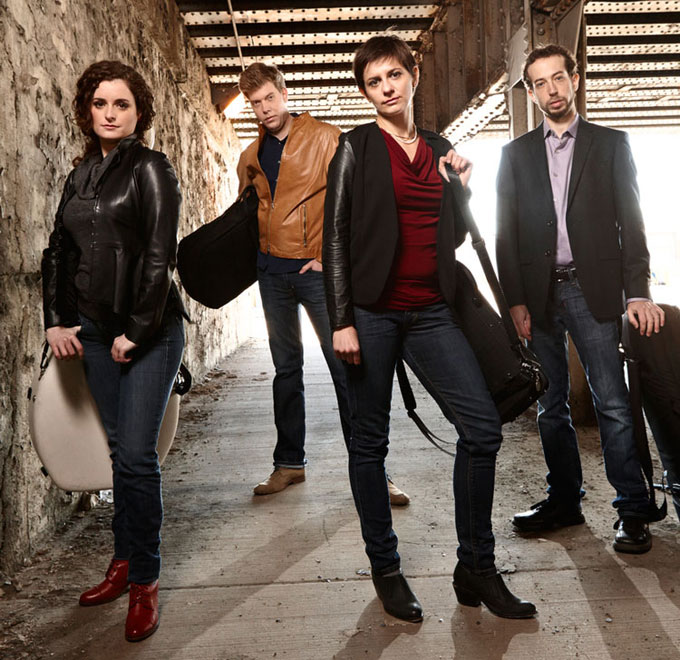Israeli String Quartet Makes Its Buffalo Debut
by Jan Jezioro

Ariel Quartet Set to Soar
The frozen tundra of the nonexistent local classical music scene that stretches from Christmas through the first few weeks of January is coming to an end. Since this situation reoccurs every year, it perhaps offers an opportunity for some enterprising classical music presenting organization to schedule a concert during this period, which might well have an eager, built-in audience.
In any case, the freeze will be broken on Tuesday January 20 at 8pm, when the Buffalo Chamber Music Series resumes with a performance, featuring the Ariel Quartet, of string quartets by Haydn, Schubert and Berg in the Mary Seaton Room of Kleinhans Music Hall. The concert will be preceded by a “Chat with the Artists” at 7:15pm, moderated by WNED-FM’s genial afternoon program host Peter Hall.
Violinists Alexandra Kazovsky and Gershon Gerchikov, violist Jan Grünig and cellist Amit Even-Tov, originally formed the Ariel Quartet in Israel, but moved to the United States in 2004 to study at the New England Conservatory’s professional quartet training program. The members of the group quickly began winning competitions, including the grand prize at the Fischoff National Chamber Music Competition in 2006, and in 2007, they won third prize at the Banff International String Quartet Competition. The quartet is currently in residence at the University of Cincinnati’s College Conservatory of Music.
In 2013 the Ariel Quartet joined a very select group of string quartets by winning the Cleveland Quartet Award for the 2013-14 and 2014-15 seasons. The biennial award, established in 1995, honors and promotes a rising young string quartet whose exceptional artistry demonstrates the potential for a major career. The award was established by Cleveland Quartet, which succeeded the now almost legendary Budapest String Quartet as the quartet-in-residence at the University at Buffalo in 1971. The Cleveland Quartet held that position until making their final move to the Eastman School of Music in 1976, where they remained until disbanding in 1995. The Cleveland Quartet joined forces with Chamber Music America (CMA) and eight prominent chamber music presenters, including our own Buffalo Chamber Music Society, to found the Cleveland Quartet Award and to raise funds for the establishment of the Cleveland Quartet Endowment Fund. The list of string quartets to win this prestigious award is a veritable roll call of the very finest young groups currently performing, including the Brentano, Borromeo, Miami, Pacifica, Miró, Jupiter, Parker, and Jasper quartets.
While Franz Joseph Haydn is universally acknowledged as the father of the string quartet form, all too often concert audiences may feel that one of his quartets has been included on a program, usually as an opening piece, strictly as a bow to history. Luckily, the Ariel Quartet has a genuine appreciation of the continuing importance of Haydn’s invaluable contribution to the string quartet genre, shown most recently in a New York City appearance just this last May. According to a review in the venerable British monthly magazine, The Strad, the go-to source for everything concerning classical music string playing, “A Haydn quartet can feel like an appetizer—nice but perhaps insignificant. The Ariel Quartet, on the other hand, presented his String Quartet Op.76 no.1 with vitality, clarity of line, depth of sound and an impeccable sense of direction.” The Ariel Quartet will be playing another quartet from this opus, the last full set of quartets that Haydn composed, the String Quartet in B Flat Major, Op. 76, No. 4, known as the “Sunrise.” Considered by many connoisseurs to be the finest among Haydn’s quartets, the work features a prominent viola part, which was the composer’s instrument of choice when playing in a string quartet. The nickname “Sunrise” comes from the beginning of the first movement, where the first violin ascends in a long curve above a sustained chord in the other instruments, similar to the rising of the sun over the earth.
Franz Schubert composed his fifteenth and final quartet, the String Quartet in G major, Op. 161, D. 887, in ten days in June 1826. Schubert, like both Haydn and Mozart, chose to perform the viola part while playing in his string quartet compositions, and he did so in the first private performance of this work, and in the first public performance of the first movement. Sadly, the first public performance of the entire work did not take place until 1850, 23 years after the composer’s untimely death.
Alban Berg composed his String Quartet, Op. 3, his only work in the genre, in 1910 when he was 25 years old, as he finished six years of study with Arnold Schoenberg, his only composition teacher. The two movement work straddles the boundary between atonality and tonality, with the first, lyrical and introspective movement, followed by a vividly agitated second movement, conveying passionate warmth that overcomes the work’s dissonances.
Tickets: $20/$10; free admission for Middle/High School students. Information: www.bflochambermusic.org
|
Issue Navigation> Issue Index > v14n2 (Week of Thursday, January 15) > Israeli String Quartet Makes Its Buffalo Debut This Week's Issue • Artvoice Daily • Artvoice TV • Events Calendar • Classifieds |









 Current Issue
Current Issue